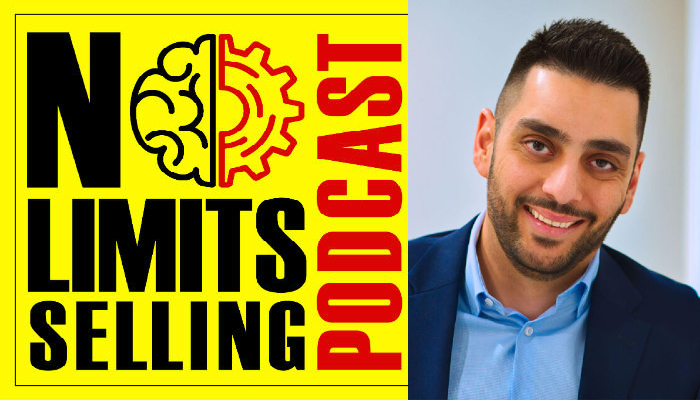How to Accelerate Business Growth With The Power Of Process
On Episode 206 of The No Limits Selling Podcast, we have Ali Davar, Real Estate Agent at The CAZA Group. Ali understands that buying or selling a home is more than just a transaction: it’s a life-altering, emotional experience. That is why in today’s market who you work with matters more than ever. Ali prides himself on his level of personal service and attention to his clients' every detail. He is a highly-seasoned real estate professional and is dedicated to providing exceptional, personalized service for all of his clients.
Ali takes great pride in the relationships he builds and will always work relentlessly on the client’s behalf to help them achieve their real estate and investment goals. He represents the best and brightest in the industry and consistently strives to lead the field in real estate market knowledge, technology, innovation, and consumer education. Today’s buyers and sellers need a trusted resource that can guide them through the complex world of real estate. With Ali’s extensive knowledge and commitment to providing only the best and most timely information to his clients, he is your go-to source for real estate industry insight and advice.

Contact Ali:
[EDITOR’S NOTE: This podcast is sponsored by No Limits Selling. It is a fun, fast-paced podcast that delivers hard-fought business advice that you can implement today to improve your sales and performance]
Interested In Our Real Estate Coaching Services? Explore Our Website: Link
Feeling Not Well Today? You Can Use Our Mindset Boosters App To amp Up Your Mood: Link
Find us on Social Media:
LinkedIn | Facebook community | Instagram
Like what do you listen to? Subscribe to our podcast!
Ready to become fearless? We can help you become fearless in 60 days so you accomplish more in your career Schedule A 15 min Call with Umar
Summary
Introduction
The podcast opens with an introduction of Ali Davar, a distinguished real estate agent at The CAZA Group. Ali is recognized for his remarkable success in the field, having built a strong reputation through his dedication and expertise in the industry.
Ali's Background
In the next segment, Ali delves into his background, revealing his early fascination with real estate that eventually led him to become a real estate agent. He recounts his journey, detailing the experiences and challenges he encountered along the way. Ali's story is one of resilience and determination, as he shares how he navigated through obstacles and emerged stronger and more knowledgeable.
The CAZA Group
Ali then shifts the conversation to The CAZA Group, a real estate company known for its innovative approach. He discusses the company's mission, which is centered on providing exceptional service to clients. Ali also highlights the company's core values and introduces the team, a group of dedicated professionals who share the same commitment to excellence. The CAZA Group's wide range of services, designed to meet the diverse needs of clients, is also discussed.
Real Estate Industry
Offering his expert perspective, Ali provides valuable insights into the real estate industry. He discusses current trends, including market shifts and consumer behavior, and makes predictions about the industry. Ali's advice to those considering a career in real estate is insightful and practical, reflecting his deep understanding of the field.
Success Strategies
In this section, Ali shares his strategies for success in the real estate industry. He underscores the importance of exceptional customer service, continuous learning, and staying abreast of industry trends. Ali's approach is holistic, focusing not just on sales, but also on building relationships and improving one's skills and knowledge.
Conclusion
In this insightful podcast, Ali Davar, a distinguished real estate agent at The CAZA Group, shares his journey from developing an early interest in real estate to becoming a successful agent. He provides a glimpse into the workings of The CAZA Group, highlighting its mission, values, team, and client-centric services.
Ali offers valuable insights into the real estate industry, discussing current trends, and future predictions, and sharing practical advice for those considering a career in the field. He also reveals his strategies for success, emphasizing the importance of exceptional customer service, continuous learning, and staying updated with industry trends. The podcast concludes with Ali expressing optimism about the future of The CAZA Group and the real estate industry as a whole, leaving listeners with valuable insights and advice.
Questions & Answers
Who is Ali Davar from The CAZA Group?
What is The CAZA Group's unique approach to real estate?
What are the current trends in the real estate industry according to Ali Davar?
What advice does Ali Davar give to those considering a career in real estate?
What are Ali Davar's strategies for success in the real estate industry?
What is the future of The CAZA Group according to Ali Davar?
Don’t miss this opportunity to transform your real estate career with one-on-one coaching. As an experienced real estate coach, I, Umar Hameed, am dedicated to helping you unlock your full potential and achieve your real estate goals. To learn more about who am I and my clients ↓
If you’re ready to take the next step, book an appointment with me today and begin your journey toward success in the real estate industry.
